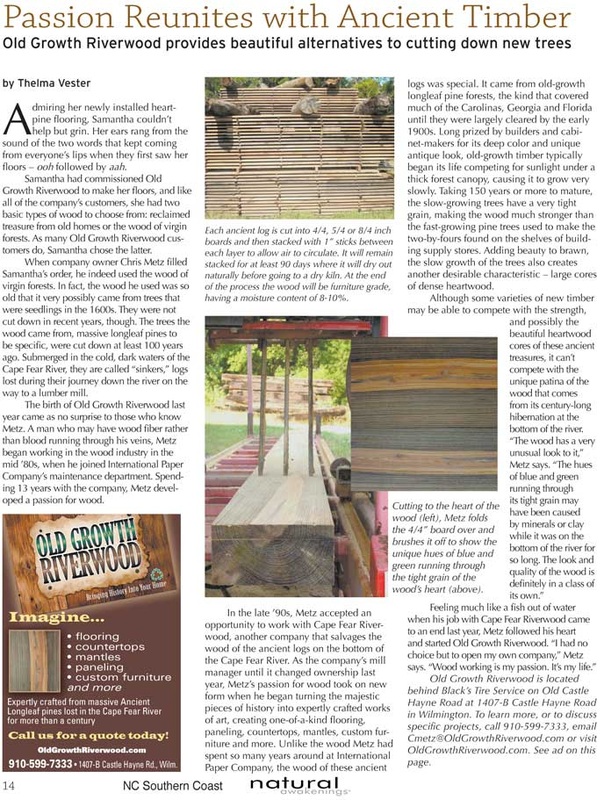Thank You!

Old Growth Riverwood provides beautiful alternatives to cutting down new trees.
by Thelma Vester Admiring her newly installed heart-pine flooring, Samantha couldn’t help but grin. Her ears rang from the sound of the two words that kept coming from everyone’s lips when they first saw her floors – ooh followed by aah.Samantha had commissioned Old Growth Riverwood to make her floors, and like all of the company’s customers, she had two basic types of wood to choose from: reclaimed treasure from old homes or the wood of virgin forests. As many Old Growth Riverwood customers do, Samantha chose the latter.When company owner Chris Metz filled Samantha’s order, he indeed used the wood of virgin forests. In fact, the wood he used was so old that it very possibly came from trees that were seedlings in the 1600s. They were not cut down in recent years, though. The trees the wood came from, massive longleaf pines to be specific, were cut down at least 100 years ago. Submerged in the cold, dark waters of the Cape Fear River, they are called “sinkers,” logs lost during their journey down the river on the way to a lumber mill.The birth of Old Growth Riverwood last year came as no surprise to those who know Metz. A man who may have wood fiber rather than blood running through his veins, Metz began working in the wood industry in the mid ’80s, when he joined International Paper Company’s maintenance department. Spending 13 years with the company, Metz developed a passion for wood. In the late ’90s, Metz accepted an opportunity to work with Cape Fear Riverwood, another company that salvages the wood of the ancient logs on the bottom of the Cape Fear River. As the company’s mill manager until it changed ownership last year, Metz’s passion for wood took on new form when he began turning the majestic pieces of history into expertly crafted works of art, creating one-of-a kind flooring, paneling, countertops, mantles, custom furniture and more. Unlike the wood Metz had spent so many years around at International Paper Company, the wood of these ancient logs was special. It came from old-growth longleaf pine forests, the kind that covered much of the Carolinas, Georgia and Florida until they were largely cleared by the early 1900s. Long prized by builders and cabinet makers for its deep color and unique antique look, old-growth timber typically began its life competing for sunlight under a thick forest canopy, causing it to grow very slowly. Taking 150 years or more to mature, the slow-growing trees have a very tight grain, making the wood much stronger than the fast-growing pine trees used to make the two-by-fours found on the shelves of building supply stores. Adding beauty to brawn, the slow growth of the trees also creates another desirable characteristic – large cores of dense heartwood. Although some varieties of new timber may be able to compete with the strength, and possibly the beautiful heartwood cores of these ancient treasures, it can’t compete with the unique patina of the wood that comes from its century-long hibernation at the bottom of the river. “The wood has a very unusual look to it,” Metz says. “The hues of blue and green running through its tight grain may have been caused by minerals or clay while it was on the bottom of the river for so long. The look and quality of the wood is definitely in a class of its own.” Feeling much like a fish out of water when his job with Cape Fear Riverwood came to an end last year, Metz followed his heart and started Old Growth Riverwood. “I had no choice but to open my own company,” Metz says. “Wood working is my passion. It’s my life.” Old Growth Riverwood is located behind Black’s Tire Service on Old Castle Hayne Road at 1407-B Castle Hayne Road in Wilmington. To learn more, or to discuss specific projects, call 910-599-7333, email Cmetz@OldGrowthRiverwood.com |





